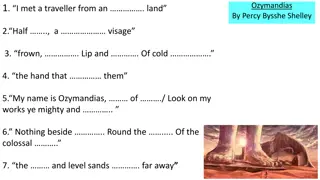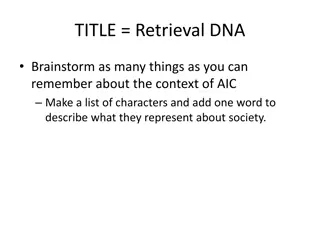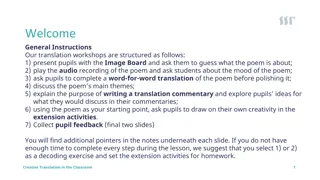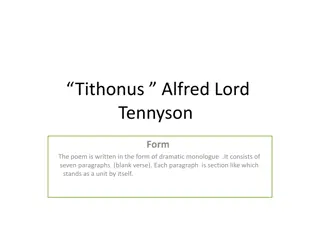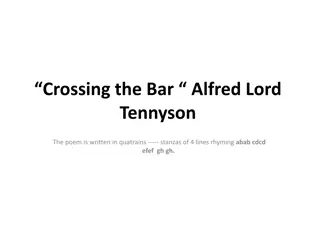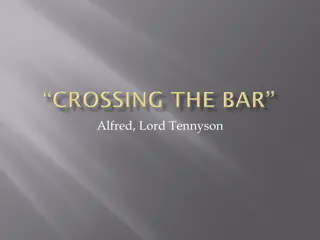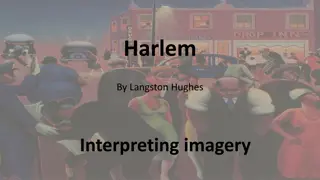Analysis of Tennyson's Poem "Break, Break, Break" and its Themes
Alfred, Lord Tennyson's poem "Break, Break, Break" reflects his deep grief and inability to express his emotions over the loss of his close friend. Through vivid imagery of the sea and its waves crashing against rocks, Tennyson juxtaposes the vitality of the external world with his internal turmoil, highlighting themes of longing, sorrow, and isolation. The poem delves into the contrast between the external reality of life's activities and the poet's internal struggles with grief, showcasing a poignant exploration of loss and memory.
Download Presentation

Please find below an Image/Link to download the presentation.
The content on the website is provided AS IS for your information and personal use only. It may not be sold, licensed, or shared on other websites without obtaining consent from the author. Download presentation by click this link. If you encounter any issues during the download, it is possible that the publisher has removed the file from their server.
E N D
Presentation Transcript
Alfred, Lord Tennyson (1809-1892) wrote many of his greatest poems in response to the sudden death of a close friend in 1833. Break, Break, Break is one such poem. The poem mourns the loss of Tennyson's friend, Arthur Henry Hallam. It conveys his sorrow , sadness, tribulation ,and depression over a lost friend. He cannot break the paralysis of grief grief over the death of his dear friend, Arthur Henry Hallam (Hallam died aged 22 in 1833 when Tennyson was only in his mid-twenties when writing Break, Break, Break in 1835)
Tennyson & the Waves It is assumed that Tennyson is the speaker and is addressing the waves of the sea, and drawing a comparison indeed, a contrast between the powerful action of the sea s waves and the relative inaction, or stasis of his own feelings. The waves are often referred to as 'breakers,' and they play a big role in Alfred Tennyson s poem, Break, Break, Break Unlike the sea, the speaker is unable to express his sad thoughts. Compared with the vitality of the sea with its waves and ships, Tennyson seems paralyzed, inactive, and unable to give voice to his sadness.
Tennyson commands the sea to break, break, break upon the cold rocks at the coast. He is watching the sea whose waves are breaking on the cold grey stones . the sea is beating the stones, and the speaker looks sad that the sea is vital and moving while he is unable to express his sadness. The waves and their movement emphasize his disability to act. Another interpretation for the recurrence of the word 'break' is that the speaker's inner wish is to crash everything in order to express his feelings of sorrow. He hears the shouting of the fisherman s boy with his sister while they play, and the young sailor sings in his boat, while he is in different mood. Other ships move silently to their haven under the hill, and this scene seems to remind him of the absence of a dear friend he cared for.
He contrasts this outward scene with the interior one, the struggle raging within his own heart: he cannot articulate his grief, the thoughts that arise , like the waves of the sea, within him. The people around him don't care about his sadness and his great loss. The poem s deeper attention is in the series of comparisons between the external world and his internal world. The outer world represents real life, or the real field where the speaker used to play. The inner world is what reflects on his mind according to the influence of the outer world. The example in this poem is the loss of his friend and his memories with him.
The poet correspondingly distances between himself and the cheerful people around him. They have happiness and completion, but he does not. The brother and sister; the sailor and his boat; the speaker has no friend. They have reason to be happy, but he has no reason to be alike. The sense of envy might be valid here, but it is usually to suggest that these unconcerned young people have fatalities yet to come. The speaker watches the stately ships proceeding to their haven under the hill, and they seem satisfied with their ends. But the grave is not a pleasurable haven, in contrast, which means, "there is no more hand to touch, no more voice to hear". The speaker is obsessed by his sad feelings, his memory of his deceased friend overwhelming what the speaker watches around him. The poet s emotional imbalance is contrasted with the ships that move forward to an attainable goal .Rather than looking forward, the poet looks back to a vanished hand and a voice that is still.
He cannot feel "the persons touch or hear the persons voice". The speaker compares between the recurrent voice of the colliding waves on the rocks and the tender grace of the bygone days with his friend that will never return to him. The final stanza reinforces his sense of paralysis: he s still where he was at the start of the poem. He watches the waves which break on the steep rock faces, with their useless efforts to go beyond. Also, for the speaker, there is no way to get the dead back. The poet s realization of the fruitlessness of action draws the reader s attention to the fact that the sea s action is, seemingly, fruitless too for all its efforts [it] can no more get beyond the rocks . Both the sea and the speaker keep their fruitless efforts since they have no other choice.



